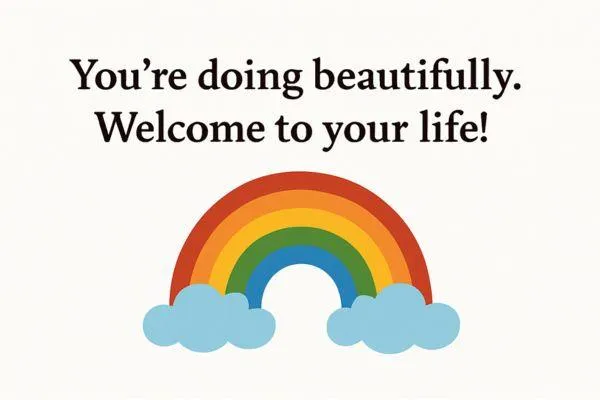
“Oops, I Did It Again”: Why Habit Change Is Messy—and That Is How It Goes

If you’ve ever tried to change a habit, you know it doesn’t exactly go perfectly. It often goes like this:
Totally normal. The truth is: habit change is not linear. It’s messy, emotional, could be hilarious, and full of unexpected lessons. And it usually takes time.
🐾 Tiny Steps Matter (Even the Wobbly Ones)
Big changes often start with small steps:
Think of these wins like seeds. Each one holds quiet potential. With care, they grow
🌿 Big Changes Born from Small Steps
Small Step: Pausing for one deep breath before reacting in a tough moment
Big Change: Over time, you become less reactive, more compassionate, and better at regulating your emotions
🍽️ Mindful Eating
Small Step: Putting your fork down between bites
Big Change: You begin to taste your food, tune into hunger cues, and make more nourishing choices with ease
Small Step: Turning off devices 15 minutes earlier each night
Big Change: Your sleep deepens, your mind clears, and fatigue stops ruling your day
🏃♀️ Fitness and Body Connection
Small Step: Moving for just 10 minutes a day—stretching, walking, or dancing
Big Change: You develop trust in your body and gently shift toward a routine that supports energy and strength
Small Step: Tracking one daily expense
Big Change: You start noticing patterns, curbing unconscious spending, and building a sense of control over your finances
Small Step: Silencing notifications after a certain time
Big Change: Your focus improves, your sleep becomes more restful, and you reclaim mental space for creativity
Small Step: Replacing “I messed up again” with “I’m still learning”
Big Change: You foster self-compassion, boost your confidence, and sustain momentum even when things get tough
Change doesn’t demand giant leaps. It asks for quiet consistency. These small shifts are like planting seeds—we water them with care, and in time they bloom into habits that reflect our deeper values.
💡 Slipping Up Is Human (and Helpful)
Slipping doesn’t mean you’re broken. It means you’re making progress. A wobble is information. It says: Adjust the outfit, not abandon the closet.
You ate a bigger than life lunch? Enjoy it! And have a light dinner
You skipped meditation for two days? Restart when ready, or change it to mindful breathing or 5 minutes of sitting in a quiet room
You let someone get the best of you? Forgive yourself and be mindful next time
You haven’t taken a vacation in forever? Start planning one

Habit change needs levity.
Laugh when your “healthy grocery trip” ends with cookies, kale, and existential dread.
Name your inner saboteur! (“Ugh, here comes Passive Patricia again…”)
Turn your habit journey into a sitcom episode. Season 1: "She Tries to Journal."
Celebrate missteps like bloopers: “I did yoga for 3 minutes and mostly rolled around. Nailed it!”
Humor transforms shame into warmth. It’s how we fall forward.
🔥 The 5-Second Rule: Your Brain's Sneaky Window
Mel Robbins coined the idea: when a helpful action pops into your brain, you have 5 seconds to do something about it—or the limbic system will shut it down.
Why? Because the brain craves safety. Change feels like risk. So unless you act fast, your old habits reclaim the wheel.
Tip:
If you wait, you hesitate. If you act, you grow.
Courage to break a harmful habit doesn’t live in motivation. It lives in moments. And it often arrives disguised as:
Curiosity: “What happens if I don’t eat the cookie and sit with the feeling instead?”
Support: A friend, a coach, a community, a playlist that screams "You’ve got this!"
Courage is choosing something new even when the old feels easier. It’s imperfect action. It’s making your future self proud, even if today’s self is scared.
🪩 Real Magic? It’s Not Linear
You’ll zig, you’ll zag, you’ll do the cha-cha and then sit down, just to get up and dance again. It’s all part of the magic of living.
Progress is a squiggle.
“The real magic of transformation isn’t in being perfect. It’s in showing up, even when you feel wobbly.”
Daily Journal Prompt
